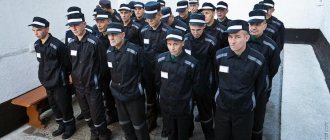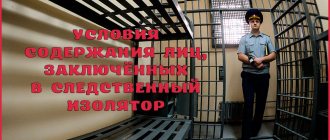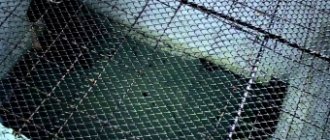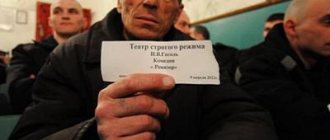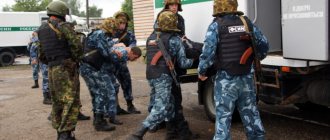Serving sentences in prisons
Prison is a type of correctional institution intended for serving sentences for the most dangerous categories of criminals. There are mainly 3 categories of convicts serving their sentences in prisons:
1) persons sentenced to imprisonment for a term of over 5 years for committing especially serious crimes;
2) those convicted of particularly dangerous recidivism;
3) convicts transferred to prison for a term of up to 3 years for malicious violation of the established procedure for serving in correctional colonies of general and strict regimes.
In addition to the listed categories of dangerous criminals, persons who, with their consent, were left in prison to perform housekeeping work may serve their sentences in prisons. According to Art. 77 of the Penal Code, such persons may be persons sentenced for the first time to imprisonment for a term of not more than 5 years and who are assigned to serve their sentence in a general regime correctional colony. They can be left only with their written consent.
And finally, temporary detention in prisons of convicted persons is allowed in the following cases:
a) if it is necessary to conduct investigative actions with the participation of a convicted person in a case of a crime committed by another person;
b) if it is necessary for the convicted person to participate in the trial of a crime committed by another person;
c) if the convicted person is brought to criminal responsibility in another criminal case and a preventive measure in the form of detention is chosen against him;
d) when transferring convicts from one place of deprivation of liberty to another.
There are 2 types of regime in prisons: general and strict, without differentiating each of them into the types of conditions for serving the sentence.
All categories of convicts entering prison are kept under strict regime, including those sentenced to imprisonment with serving part of their sentence in prison, and convicts transferred to prison for violating the regime in correctional colonies of all types of regimes. In addition, convicts who are recognized as persistent violators when kept in prison under a general regime are kept in a strict regime.
However, the legislator limits the circle of persons who can be kept in strict regime. These include; a) convicted pregnant women and women with young children; b) convicts who are disabled people of group I or II.
The majority of convicts serving their sentences in prison are kept under general regime. As a general rule, convicts who have served a strict regime for at least one year are sent to a general regime, provided they have no violations of the regime.
Since prisons contain the most dangerous categories of criminals, when executing their sentences, the legislator sets, first of all, the goal of preventing these persons from committing new crimes while they are serving their sentences. This is achieved by increasing isolation and tightening the conditions of their detention.
In accordance with Art. 131 of the Penal Code, convicted persons are, as a rule, kept in general cells. In necessary cases, by a reasoned decision of the head of the prison and with the consent of the prosecutor, convicted persons may be kept in solitary confinement. Placement in cells is carried out taking into account the established Art. 80 of the Penal Code requires separate detention of men, women and other categories of convicts.
Convicts transferred from one correctional facility to another are kept isolated from other convicts and kept separately; convicts left in prison to perform maintenance work. In addition, convicts under general and strict regimes are kept separately.
Convicts held in general regime prisons:
- can spend monthly on the purchase of food and basic necessities the funds available in their personal accounts in the amount of 40% of the minimum wage;
- have the right to 2 short-term and 2 long-term visits per year;
- have the right to receive 2 parcels or transfers and 2 parcels during the year;
- can enjoy a daily walk lasting 1.5 hours.
More stringent conditions of serving are provided for convicts serving sentences under strict conditions. They are allowed:
- spend monthly on the purchase of food and basic necessities the funds available in their personal accounts in the amount of 20% of the minimum wage;
- have 2 short-term dates per year;
— receive one parcel and one parcel per year;
- Take a daily walk of one hour.
Specific in comparison with the rights of persons held in correctional colonies is the right to daily walks. It is due to cell-by-cell placement and the need to preserve the health of convicts by staying in the fresh air. The walk takes place during the day in a specially equipped part of the prison grounds. Since a daily walk is the right of a convicted person, it cannot be canceled or reduced as a disciplinary sanction. The law provides for the only reason for its early termination - violation by the convicted person of the established internal rules during a walk.
Convicts held in prisons have the right to meet with relatives and other persons in accordance with the rules established by Art. 89 PEC. Telephone conversations are allowed to them only in exceptional cases and are paid for by the convicts themselves.
Incentive measures and penalties are also applied to them, in accordance with the norms set out in Art. 113-117 Penal Code of the Russian Federation. The specificity of the legal status of convicts held in prison is also manifested in the measures of encouragement and punishment applied to them.
Thus, for good behavior, a conscientious attitude to work and training, the legislator provides for an increase in the walking time of convicted persons to 2 hours a day for a period of up to one month.
The peculiarities of keeping convicts in prison also determine the specifics of applying corrective measures to them.
In accordance with Art. 103 of the Penal Code of the Russian Federation, the labor of convicts in prisons is organized only on the territory of the prison. In the absence of the possibility of creating special premises in prison, the work of convicts is organized in cells, which limits the choice of types of labor activity. Working convicts have the right to annual paid leave of 12 working days without leaving the prison.
The opportunities for general educational and vocational training in prisons are quite limited, since, as a rule, there are no special premises for this. In addition, this is complicated by the need to comply with regime requirements for the separate detention of different categories of convicts, which prevents the creation of study groups.
Educational work with convicts held in prisons, as a rule, is carried out in cells, which complicates the choice of methods and forms of its organization, and one of the real and rather specific forms of educational work in these conditions is the use of radio-equipped cells.
At the same time, it should be emphasized that the persistent reluctance of this category of convicts to take the path of correction, their focus on reproducing the traditions of the criminal world, and the psychological situation in these institutions do little to contribute to the perception and effectiveness of the impact of educational measures. Taking this into account, the legislator, unlike previous legislation, does not provide for the creation of amateur organizations of convicts.
A different regime of detention in prisons is provided for convicts left in prison for work in economic maintenance. They serve their sentences under the conditions provided for persons serving their sentences in general regime correctional colonies. In addition, the law (Part 3 of Article 77 of the Penal Code) specifically states that this category of convicts is kept separately in unlocked common cells; they enjoy the right to a daily walk of 2 hours.
The conditions of detention of convicted persons temporarily left in prison in connection with participation in investigative actions or trial of a crime committed by another person correspond to the conditions of detention of the type of correctional facility that was determined by the court when imposing punishment.
Convicts who are brought to criminal responsibility in another case have a legal status that is determined by the conditions for serving the sentence of the type of penal institution that was assigned to them by the court. However, in accordance with the Federal Law “On the detention of suspects and accused of committing crimes,” certain adjustments are made to this status. Thus, visits to this category of persons are granted only on the basis of written permission from the person or body in charge of the criminal case.
Prison is a type of correctional institution intended for serving sentences for the most dangerous categories of criminals. There are mainly 3 categories of convicts serving their sentences in prisons:
1) persons sentenced to imprisonment for a term of over 5 years for committing especially serious crimes;
2) those convicted of particularly dangerous recidivism;
3) convicts transferred to prison for a term of up to 3 years for malicious violation of the established procedure for serving in correctional colonies of general and strict regimes.
In addition to the listed categories of dangerous criminals, persons who, with their consent, were left in prison to perform housekeeping work may serve their sentences in prisons. According to Art. 77 of the Penal Code, such persons may be persons sentenced for the first time to imprisonment for a term of not more than 5 years and who are assigned to serve their sentence in a general regime correctional colony. They can be left only with their written consent.
And finally, temporary detention in prisons of convicted persons is allowed in the following cases:
a) if it is necessary to conduct investigative actions with the participation of a convicted person in a case of a crime committed by another person;
b) if it is necessary for the convicted person to participate in the trial of a crime committed by another person;
c) if the convicted person is brought to criminal responsibility in another criminal case and a preventive measure in the form of detention is chosen against him;
d) when transferring convicts from one place of deprivation of liberty to another.
There are 2 types of regime in prisons: general and strict, without differentiating each of them into the types of conditions for serving the sentence.
All categories of convicts entering prison are kept under strict regime, including those sentenced to imprisonment with serving part of their sentence in prison, and convicts transferred to prison for violating the regime in correctional colonies of all types of regimes. In addition, convicts who are recognized as persistent violators when kept in prison under a general regime are kept in a strict regime.
However, the legislator limits the circle of persons who can be kept in strict regime. These include; a) convicted pregnant women and women with young children; b) convicts who are disabled people of group I or II.
The majority of convicts serving their sentences in prison are kept under general regime. As a general rule, convicts who have served a strict regime for at least one year are sent to a general regime, provided they have no violations of the regime.
Since prisons contain the most dangerous categories of criminals, when executing their sentences, the legislator sets, first of all, the goal of preventing these persons from committing new crimes while they are serving their sentences. This is achieved by increasing isolation and tightening the conditions of their detention.
In accordance with Art. 131 of the Penal Code, convicted persons are, as a rule, kept in general cells. In necessary cases, by a reasoned decision of the head of the prison and with the consent of the prosecutor, convicted persons may be kept in solitary confinement. Placement in cells is carried out taking into account the established Art. 80 of the Penal Code requires separate detention of men, women and other categories of convicts.
Convicts transferred from one correctional facility to another are kept isolated from other convicts and kept separately; convicts left in prison to perform maintenance work. In addition, convicts under general and strict regimes are kept separately.
Convicts held in general regime prisons:
- can spend monthly on the purchase of food and basic necessities the funds available in their personal accounts in the amount of 40% of the minimum wage;
- have the right to 2 short-term and 2 long-term visits per year;
- have the right to receive 2 parcels or transfers and 2 parcels during the year;
- can enjoy a daily walk lasting 1.5 hours.
More stringent conditions of serving are provided for convicts serving sentences under strict conditions. They are allowed:
- spend monthly on the purchase of food and basic necessities the funds available in their personal accounts in the amount of 20% of the minimum wage;
- have 2 short-term dates per year;
— receive one parcel and one parcel per year;
- Take a daily walk of one hour.
Specific in comparison with the rights of persons held in correctional colonies is the right to daily walks. It is due to cell-by-cell placement and the need to preserve the health of convicts by staying in the fresh air. The walk takes place during the day in a specially equipped part of the prison grounds. Since a daily walk is the right of a convicted person, it cannot be canceled or reduced as a disciplinary sanction. The law provides for the only reason for its early termination - violation by the convicted person of the established internal rules during a walk.
Convicts held in prisons have the right to meet with relatives and other persons in accordance with the rules established by Art. 89 PEC. Telephone conversations are allowed to them only in exceptional cases and are paid for by the convicts themselves.
Incentive measures and penalties are also applied to them, in accordance with the norms set out in Art. 113-117 Penal Code of the Russian Federation. The specificity of the legal status of convicts held in prison is also manifested in the measures of encouragement and punishment applied to them.
Thus, for good behavior, a conscientious attitude to work and training, the legislator provides for an increase in the walking time of convicted persons to 2 hours a day for a period of up to one month.
The peculiarities of keeping convicts in prison also determine the specifics of applying corrective measures to them.
In accordance with Art. 103 of the Penal Code of the Russian Federation, the labor of convicts in prisons is organized only on the territory of the prison. In the absence of the possibility of creating special premises in prison, the work of convicts is organized in cells, which limits the choice of types of labor activity. Working convicts have the right to annual paid leave of 12 working days without leaving the prison.
The opportunities for general educational and vocational training in prisons are quite limited, since, as a rule, there are no special premises for this. In addition, this is complicated by the need to comply with regime requirements for the separate detention of different categories of convicts, which prevents the creation of study groups.
Educational work with convicts held in prisons, as a rule, is carried out in cells, which complicates the choice of methods and forms of its organization, and one of the real and rather specific forms of educational work in these conditions is the use of radio-equipped cells.
At the same time, it should be emphasized that the persistent reluctance of this category of convicts to take the path of correction, their focus on reproducing the traditions of the criminal world, and the psychological situation in these institutions do little to contribute to the perception and effectiveness of the impact of educational measures. Taking this into account, the legislator, unlike previous legislation, does not provide for the creation of amateur organizations of convicts.
A different regime of detention in prisons is provided for convicts left in prison for work in economic maintenance. They serve their sentences under the conditions provided for persons serving their sentences in general regime correctional colonies. In addition, the law (Part 3 of Article 77 of the Penal Code) specifically states that this category of convicts is kept separately in unlocked common cells; they enjoy the right to a daily walk of 2 hours.
The conditions of detention of convicted persons temporarily left in prison in connection with participation in investigative actions or trial of a crime committed by another person correspond to the conditions of detention of the type of correctional facility that was determined by the court when imposing punishment.
Convicts who are brought to criminal responsibility in another case have a legal status that is determined by the conditions for serving the sentence of the type of penal institution that was assigned to them by the court. However, in accordance with the Federal Law “On the detention of suspects and accused of committing crimes,” certain adjustments are made to this status. Thus, visits to this category of persons are granted only on the basis of written permission from the person or body in charge of the criminal case.

